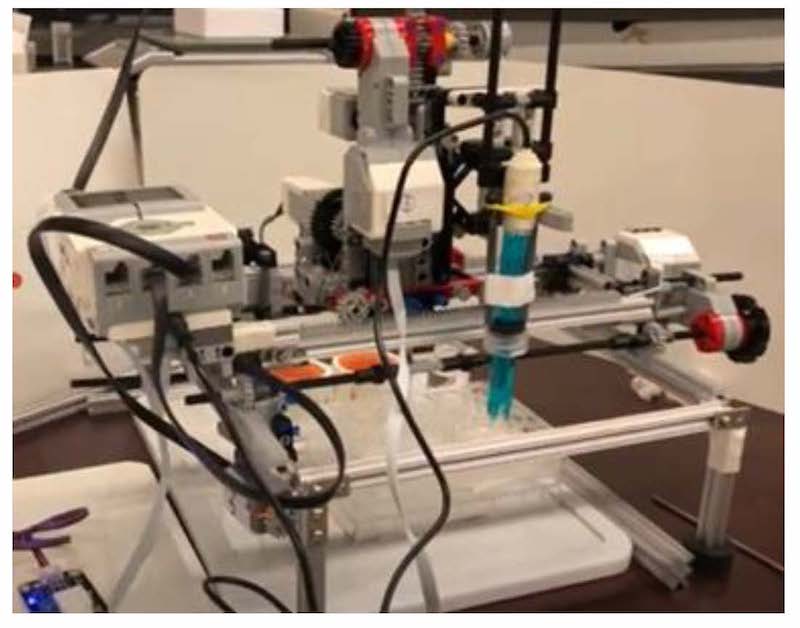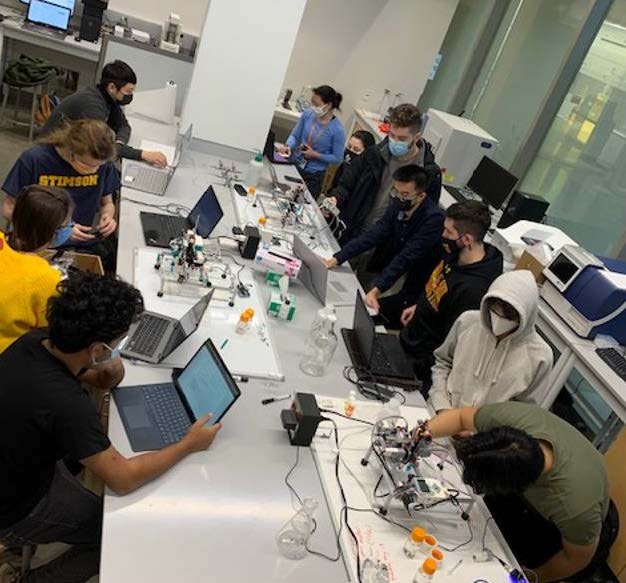UMD and NIST develop LEGO-based robots for teaching artificial intelligence
From smart phones to autonomous vehicles, artificial intelligence (AI) and machine learning (ML) are increasingly becoming ubiquitous in all aspects of technologies, and an appropriately skilled labor force is in demand in all aspects of STEM fields. The burden of training the students falls squarely on engineering and physical science departments at universities. Many institutions are taking on this challenge, and the faculty in fields which, until recently, were not synonymous with computer science are coming up with innovative ways to teach concepts which fold in advanced ML into traditional curriculums such as chemistry and materials engineering. The faculty at the University of Maryland (UMD) in collaboration with scientists at National Institute of Standards and Technology (NIST) have come up with an inexpensive autonomous experiment kit made of LEGO© MINDSTORMS© in order to expose students to the concept of robot science where a computer algorithm decides the sequence of experimental tasks at each step based on the previous results. “Autonomy is not just for cars. From drones to manufacturing, autonomy is the future of industry,” explains Gilad Kusne, an adjunct professor of the Department of Materials Science and Engineering (MSE) at UMD and a research scientist at NIST. LEGO pieces such as motors, rails, and sensors are used for the mini laboratory construction which carries out simple experiments autonomously. LEGOLAS, which stands for LEGO-based low-cost autonomous scientist, learns the laws of physics or chemistry by itself. In one example exercise, LEGOLAS selects a particular mixing ratio of two chemicals, and after measuring the property of the mixture, it moves on to the next ratio. In this “closed-loop” manner, LEGOLAS continues to self-navigate the sequence of experiments, until the desired outcome is achieved. This is truly an autonomous experiment where ML and AI algorithms decide what to do next based upon learning from the previous step. “The funny thing is there are industrial scale equipment to do essentially the same thing which can cost hundreds of thousands of dollars. We wanted to build a simple kit which can be used to reach a wide range of students in a classroom setting,” says Ichiro Takeuchi, a UMD MSE professor and graduate program director who co-teaches the Machine Learning for Materials Science class with Kusne. The LEGOLAS project is the final project for the course, which is offered to MSE undergraduates and graduate students at UMD, but LEGOLAS teaching modules for middle and high schools are in the works. The UMD-NIST joint team described their creation of the LEGOLAS kit in an article published in MRS Bulletin (https://doi.org/10.1557/s43577-022-00430-2). The first author, Logan Saar, then an undergraduate (now a graduate student) in the UMD MSE Department, played a key role in developing the LEGOLAS kit while taking the Machine Learning for Materials Science class. “It was a lot of fun building the LEGOLAS kit from scratch using LEGO pieces and coding the computer to perform the autonomous experiment,” says Saar. “We worked in small groups during the class’s final project assignment and it was gratifying to be able to implement AI algorithms to drive the autonomous decision-making. We learned a lot from this hands-on training of ML and AI, and will be able to use the learning for future research.” “ML and AI and computer simulations are becoming increasingly important skills for materials engineers”, says JC Zhao, Chair of the UMD MSE Department. “I urged Drs. Takeuchi and Kusne to develop the Machine Learning for Materials Science course based upon the content of their famed ML and AI summer bootcamps (https://www.nanocenter.umd.edu/events/mlmr/). I am thankful that they took up my suggestion and implemented the course for our students.”
“We are at the forefront of implementing computer programming and ML and AI courses into MSE curriculums to train the next generation materials engineers”, says Zhao. “The idea is to get kids to have fun building LEGO robots, and before they know it, they are doing machine learning, materials engineering, and robotics,” says Takeuchi. Watch the YouTube video for more information - https://www.youtube.com/watch?v=TtPM7zXI5kQ&t=200s
Related Articles: November 11, 2022 Prev Next |



 Zhao has also implemented a Python programming class for the first-year undergraduates in MSE so they can learn coding early and apply their programming capability throughout their undergraduate curriculum. By their junior and senior years, the students are able to code AI and ML algorithms to realize autonomous experiments.
Zhao has also implemented a Python programming class for the first-year undergraduates in MSE so they can learn coding early and apply their programming capability throughout their undergraduate curriculum. By their junior and senior years, the students are able to code AI and ML algorithms to realize autonomous experiments.